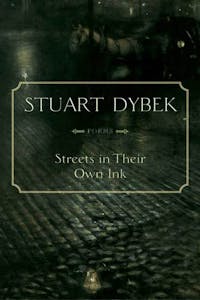Streets in Their Own Ink
Poems
 Download image
Download image
ISBN10: 0374529914
ISBN13: 9780374529918
Trade Paperback
88 Pages
$15.00
CA$17.50
In his second book of poems, Stuart Dybek finds vitality in the same vibrant imagery that animates his works of fiction. The poems of Streets in Their Own Ink map the internal geographies of characters who inhabit severe and often savage city streets, finding there a tension that transfigures past and present, memory and fantasy, sin and sanctity, nostalgia and the need to forget. Full of music and ecstasy, these poems consecrate a shadowed, alternate city of dreams and retrospection that parallels a modern city of hard realities.
Reviews
Praise for Streets in Their Own Ink
"Thoughtful, carefully structured, and beautifully coherent . . . [A] complex and rewarding [book] for readers of contemporary American poetry."—Kate Washington, San Francisco Chronicle
"[Streets in Their Own Ink is] filled with moody nocturnes [and] long, rhythmic, solitary walks through city streets at night [and] a gritty realism infused with a sense of the marvelous."—Edward Hirsch, The Washington Post Book World
"A poet of the city, [Dybek] offers us what Eliot once called 'such a vision of the street / as the street hardly understands.'"—Sandra M. Gilbert, Poetry
"The wonder of Dybek's poetry is his ability . . . to make the reader respond, empathize and believe the anger, desire, foolishness, belief and love of his characters . . . His poems are ultimately poems of praise—visionary fragments that reflect human endurance and awareness amid deprivation and potential despair."—Lawrence Joseph, Detroit Free Press
"Postmodern poetry these days, as practiced by some leaders of poetic taste, shows little interest in communication. It juxtaposes unconnected bits that surprise us by their odd change of direction. Stuart Dybek's slim volume comes as welcome relief. His poems actually compute."—America magazine
"The author of several short story collections and professor of English at Western Michigan University, Dybek here delivers his second book of poetry. His new collection deals with the tension between nostalgia and a world beyond memory. The first poem, 'Windy City,' sets the scene (we're in Chicago); the following nine-part poem, 'Autobiography,' is full of fragmentary childhood memories: 'I've left out nothing; / these images are what I learned.' 'Anti-memoir,' which finishes the collection, is the antithesis of 'Autobiography'; also in nine parts, it depicts a bleak city beyond recall or longing. It is in this darkly persuasive work that Dybek escapes Chicago for a wider if more desolate and frightening world. The imagery in other poems suggests that nature is creeping back into the city that seemingly had destroyed it, along with memories and love itself. Dybek's readable poetry powerfully conveys mood and place. Recommended."—Library Journal
"Dybek's ravishing short stories, appearing most recently in I Sailed with Magellan, are remarkably poetic; his stunning poems possess fiction's velocity; and both grow out of his mythic sense of place, that is, of a city not only of brick and mortar but also of dreams and reflections. Profoundly attuned to the music of the senses and to nature's persistence, Dybek unveils worlds within worlds as a young boy submerges his soapy head in water, a girl's unbuttoned sundress falls, and nighthawks fly past an illuminated billboard. So precise are his arresting descriptions, and so startlingly lucid are his metaphors, his poems ignite in the mind like unexpected fireworks. As the titles 'Autobiography,' 'Journal,' and 'Anti-Memoir' suggest, Dybek is intrigued with the workings of memory and the skewed stories we tell ourselves about ourselves. Wind-blown scraps of paper, snatches of music, and echoes of church rituals in everyday gestures, all are haunting intimations of our transitoriness and our tentative connections. Kin to the work of Charles Simic, Dybek's tensile poems possess a phosphorescent beauty and express a wry yet tender regard for all that makes us human."—Booklist (starred review)



